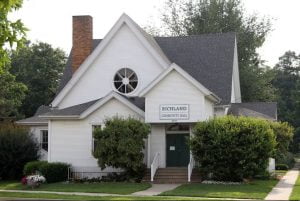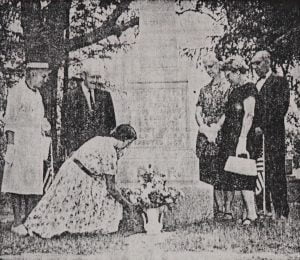This article narrates the journey of establishing a town hall in Richland Township, starting from the collective decision in 1889 to raise funds for its construction, through the selection of a suitable location, to the eventual building process fraught with debates, delays, and a fire that destroyed the partially completed structure. Highlighting the community’s perseverance, the narrative underscores the town hall’s symbolic importance as a venue for public discourse, decision-making, and the exercise of civic duties. Through the lens of Richland Township’s experience, the article illustrates the broader theme of how such institutions embody the principles of representative government and serve as a testament to the pioneering spirit and democratic values of early American settlers.
Richland Township, Michigan Town Hall
by Lorenz H. Loesel
Every community that had an organized township and township board felt that a town hall was needed so that the functions of the township and its board could be carried out. The town hall stood as a symbol of true democracy where representative government would be made available to each and every constituent of their respective community. This institution has become such an integral part of the American scene that we accept it as part of our culture and government. However, we must bear in mind that this type of local government, as applied to county and township, developed in the New England States. Later, this pattern of government was adopted in the Northwest Territory, and our pioneering forefathers followed this type of local government. In Southern and Western States of our country, the county and precinct governments were the prevailing local government forms.

As we view our township in the early formative period, the district schools, stores, homes of the township officials, or other designated places served as meeting places for township meetings. We have many records where the district schools served as voting centers in the early years of our township. As we approach the late 1800s, Richland’s population had increased, and a strong tradition plus the actual need for a township hall were recognized.
Studying the township records of this period, we find that as early as April 1, 1889, a township vote was taken to decide whether the voters were willing to raise one thousand dollars to build a town hall. The balloting showed 163 in favor and 11 against the proposal. At the next meeting, the township board appointed Jedd Bennett to get plans and specifications for the proposed town hall. Mr. Bennett was also instructed to go to Saginaw and see about the deed of the lot and specifications for the town hall. At this meeting, it was also decided which lot in Hemlock City would be chosen as a possible site for the proposed building.
Here the minutes indicate that the board adjourned for thirty minutes so that the township officials could find a suitable place for the town hall. From this point, let us follow the township records and note how our present township hall came into being: “Resolved that the Board agree to purchase lot No. 4 of block No. 7 in Hemlock City for the sum of eighty dollars. Carried. January 31, 1890, L. Thomas, Town Clerk.” (1) (According to an old township map, lot number four would be the present place where our fire hall is located. Later another parcel of land was bought which is the present place of our township hall. I have not been able to determine why the original purchased lot was not used for a building site.)
As we continue reading the records, we find: “Resolved that the Township Board and their successors in office be and do hereby constitute themselves a building committee to purchase a site, purchase plans and specifications, advertise for bids, let contracts, approve of the necessary work in the erection of said building… Adopted by said board… Moved and supported that lot number four of block seven in Hemlock City be purchased from James McMannis for the Township Hall for the sum of eighty dollars. Carried. Clerk of said Township be instructed to draw an order for the sum of eighty dollars for number four block number seven on receipt of deed and abstract of said lot showing clear title to the same… Carried…Moved and supported that the plans and specifications furnished by F. W. Hollister for the Township Hall be adopted by said board… Carried. Dated this first day of March 1890, L. Thomas, Clerk.” (1)
The minutes which continue are of particular interest: “Moved and supported that the Building Committee proceed to open bids…Carried. E. G. Hogins agrees to build Town Hall for $935; Judd Mattox, $900; H. E. Histed, $825. Moved and supported that the bid of H. E. Histed to build the hall for $825 be accepted. Carried. March 1, 1890, L. Thomas, Town Clerk… Resolved that the warranty deed of James McMannis for lot three block seven of Hemlock City be accepted and an order of seventy dollars be drawn on the Town Hall Fund in payment of the same… Dated at Richland this 19th of April, 1890… Daniel McMullen, Township Clerk. Moved and supported that Sherman Chase be appointed to wait on H. E. Histed and learn of his intention as to the time he contemplates commencing the building of the township hall… Carried. Moved and supported that the Township Clerk be instructed to notify Thomas Newrick to remove the building from the township hall site on block seven now owned by said Thomas Newrick. Dated August 27, 1890… Daniel McMullan.” (1)
We can see that the original site had been enlarged, and there were two lots available on which the township might build. It would have been an interesting chapter in the history of Richland Township if we had the complete story of this transaction. The good father did not record the entire procedure at this time because some of the language would have been too uncharitable. First of all, the township board felt that the builder was too slow in completing the building. The minutes show that every attempt was being made to encourage the builder to finish the project. It is almost humorous to picture these officials at their board meetings trying to get things done, and then their efforts are not rewarded with due dispatch. According to the late Mr. Earl, I gathered that this entire project was highly controversial, and many heated arguments ensued. While the fathers were debating these hot issues, the partly finished township hall caught the spirit of the matter and burned to the ground. Again, our fathers were without a town hall, and now some more work had to be done so the building could be erected.

The township records then reveal that there was a change of contractors, and this is contained in the following minutes of the township board meeting of August 18, 1891: “The contract for the construction of the Township Hall executed by Laverge Thomas and Parley C. Thomas with bonds for the performance of the same were presented to the Board. Moved and supported that the clerk be instructed to place the plans and specifications for the Township Hall at the disposal of the contractor… Carried. Moved and supported that the Town Hall be built one row of piers further back from the East Line of lots of the Town Hall site… Carried. (1)
Apparently, the building was completed in the year of 1891, and a few minor additions were made the following year. It is of no great consequence as to the exact date of completion, but it is of particular interest as to the human element which played such an important part in the building of this town hall. We can see these men in their role as public officials. Each one of them made every attempt and effort to carry out his responsibility to the best of his ability. However, their respective views were not always in full agreement, and so each one made a determined effort to convince his colleague. Here we are at the grassroots of local government and its dynamic influence in later years.
The sons and daughters of these pioneers have a heritage which gold and silver are unable to measure. These fathers were individuals who were determined to build a political institution that would serve their community and nation. Even though many of these town halls and village halls may lack the finish and luster of famed buildings, let us not forget that these very buildings are the bastions of democracy where freedom to speak, freedom to vote, and many other constitutional liberties are fostered and nurtured.
